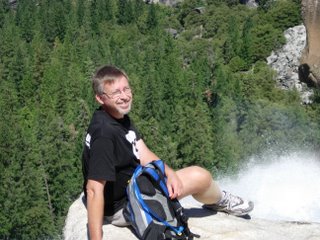getting down to business
I returned to Pasadena late last night, so today marks the official beginning of my "living with cancer" experience. I kicked it off rather stupidly. Given a brief opportunity between the fast that ended after this morning's PET-scan and the one that began at noon in anticipation of tomorrow's colonoscopy, stuffing myself with all the eggs and pancakes I could force down my asophagus seemed like a good idea. I didn't know that at 3:00 I would be expected to guzzle an entire gallon of an awful concoction named--not without a bit of giggling, I'm sure--"Go-Lytely," whose function I won't describe, other than to say that I am composing today's journal entry roughly four minutes at a time. The battle against which you steel yourself in advance is seldom the one you actually have to fight.
What a gift to have been able to prepare myself with a week in Seattle and Lynden! The depth and breadth of friendships centered around Bethany Community Church--the ways these relationships interlock, the sacrifices we would make for one another, and the utter security of belonging to such a community--became much clearer to us in 2003, after we had moved away, than at any time during the seven years when we were right there in the middle of it. Our times with friends over the last week reminded us that we are still very much a part of this circle, however many miles may separate us.
Sunday, I explained my situation to the congregation at Bethany's morning services, and several members came forward to pray over me. I shared a few specific requests, which I think bear repeating:
For time and physical strength to do whatever work lies ahead of me. I'm quite committed to completing my dissertation, continuing in teaching responsibilities, and taking advantage of ministry opportunities as they arise. I feel relatively optimistic concerning stamina, motor skills and bodily capability over the next couple of years. I ask that God may grant me whatever I need to complete my tasks well.
For mental and emotional centeredness. The worst part of my previous experience with chemotherapy was the effect of the drugs on my mind and moods. Some afternoons, I felt utterly immobilized by a despondency, horror and repugnance toward everything around me that went beyond any rational response to my having cancer. After nineteen years, I still can't adequately describe the experience, but I'm convinced it was at least partly a chemical reaction to the medications I was receiving. I understand that chemotherapy has changed radically over the years, and I know, too, that I was receiving an unusually powerful dosage back in 1987-88, so I don't expect to experience quite the same thing this time around. But if my time is limited, I want to spend as little of it as possible lost inside myself.
For Karla. She's facing an entirely different battle than mine. I've been amazed at the personal resources that she has demonstrated over the last couple of weeks. I pray that God would daily renew her spirit and body, that he would give her joy to match her pain, and that he would continue to draw us together in this experience and to fill our home with laughter.
For wisdom and clarity as we think about our future. For the time being, our place seems to be here in Pasadena. I'm finishing school, Karla's a coach for Team in Training, the medical services I need are right here. But a year from now, who knows what path we'll take? If teaching opportunities arise in other parts of the country, we should probably look at them, but we will also have to examine carefully the advisability of moving far away from our current networks of support at such a critical time. We ask for wisdom and clarity as we seek to integrate responsible hope for the future with a realistic assessment of our limitations and needs.



